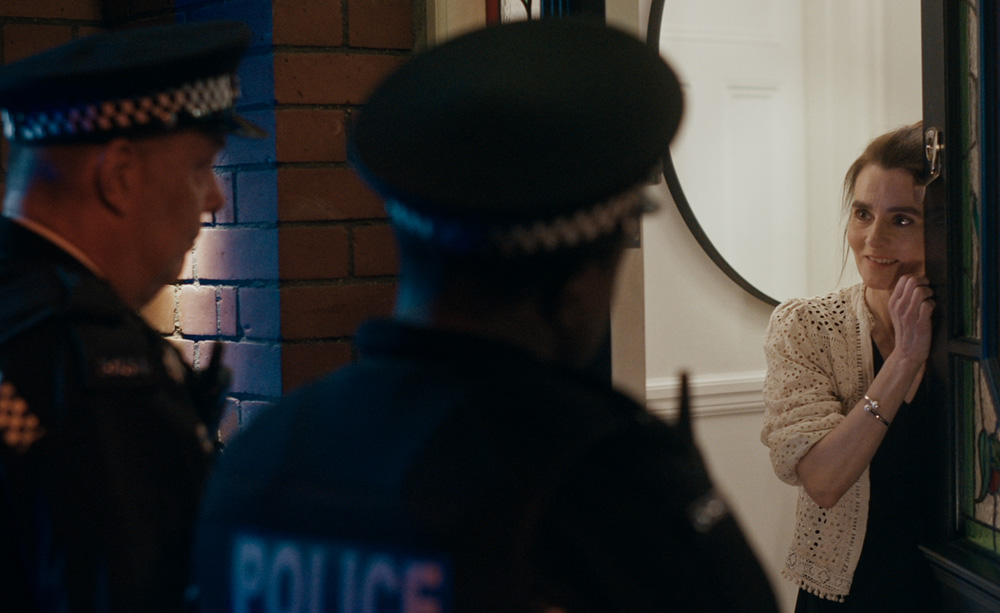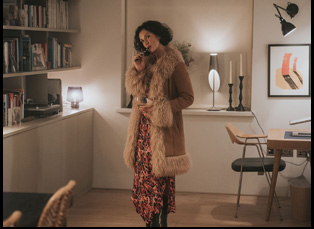It doesn’t seem like it should be too much of an inconvenience when Beth (Olivia Williams) tells Sarah (Shirley Henderson) that she’ll be bringing along another guest to her dinner party in “The Trouble with Jessica,” but it isn’t the extra place setting that is of concern to the host, but all that the unexpected attendee Jessica (Indira Varma) will be bringing with her. She has some idea of what their mutual friend from college has been up to, having recently charted on the best seller list with a novel with a logline suspiciously familiar to their days back at school, but the less known the better when Jessica has always seemed to have a thing for Sarah’s eventual husband Tom (Alan Tudyk) and she’d rather leave it in the past. Still, Beth, who tends to abuse survivors in her day job as a social worker, is loathe to leave anyone behind as she senses Jessica is in an emotionally precarious spot and some company might do her good, loading her into the car along with her husband Richard (Rufus Sewell) for the evening out.
Ultimately, the berry-studded clafoutis that sits on the table for much of the evening isn’t the only dessert that’s served up cold in Matt Winn’s bleak black comedy in which Jessica leaves the dinner party almost immediately after arriving, but not in the way anyone would want. While a nosy neighbor wanting to get her book sign is a constant irritation, it is hardly the worst part of the evening for the friends who are stunned to find Jessica dead in the backyard after quietly excusing herself from the room early on in the night, leaving the group to rack their brains for why she’d do such a thing while scrambling to determine what to do with the body when Sarah and Tom are about to close a sale on their home, which they fear will be upended if it’s known a suicide happened on the property. The death certainly brings out the worst in the four friends who all have different senses of their moral obligation to report the death to authorities, even apart from their personal feelings towards Jessica, who had complicated relationships with all of them, yet Winn and co-writer James Handel find wicked humor in both the rationalizations that Beth, Sarah, Tom and Richard all make to justify their actions as they don’t want the loss of life to destroy four more as well as their haphazard attempt to carry Jessica’s corpse back to her apartment unnoticed.
Unfolding with chapter breaks that you might be sneaking a peek at what Jessica originally wrote in her novel, the film proves to be a page turner all on its own as Winn zips around Tom and Sara’s luxe duplex, uncovering intrigue around every corner, and the dark scenario affords the talented ensemble the ability to show their considerable range as “The Trouble with Jessica” moves fluidly between comedy and tragedy. A jazzy score accentuates a film that constantly puts audiences on edge and after a celebrated festival run, the film is welcoming more to the table this week as it begins its stateside theatrical run. Recently, Winn took the time to talk about turning sad events in his own life into something cathartic with his latest film, bringing his skills as a saxophonist into the mix and working with such a strong cast.
There’s two answers to that. My co-writer and I wanted to make a satire about people a little like our friends and it’s interesting because the movie came out in the UK and some of the papers, especially the kind that I don’t particularly like, like the Daily Mail, gave the movie one star and it said “These are the most disgusting people I’ve ever seen put on screen. I wouldn’t want to be with any of them” and I thought that’s really interesting because I bet your friends are exactly like these people. So these people are a bit like my friends, who are just people trying to do the best they can to get through the day. A friend of mine is a barrister and he does a lot of rape cases and murder trials and there’s a lot of black humor around because they’re dealing with the most horrific things but actually to them the whole thing is a big performance. One of my lines that seems to work quite well when I’m introducing the film is to say to people “You comfortable?” And they go, “Yeah, yeah.” And then I say, “Right, well hopefully you won’t be in 10 minutes time.” I want to make the comfortable feel uncomfortable.
I also had some personal experiences. A girlfriend of mine committed suicide and it was a very tragic event. It had a massive fallout on lots of people’s lives, but it resulted in a lot of changes in my life um and when we were looking for a hook, I thought “Hold on a minute, I know two men that have hung themselves in other people’s gardens.” Ultimately, I knew I was exploiting the tragedies of some people that I knew for entertainment, but also to try and say something important because I think the film deals with mental health issues and the nature of certain psychiatric conditions that we can’t necessarily control. I wouldn’t say it’s central to the film but not everybody’s happy all the time and and everybody has a bit of tragedy in their life and we have to learn how to deal with it. The idea of what are you going to do if somebody kills themselves in your garden three days before you’re trying to sell your house seemed to be a pretty good dilemma and since I knew two people that had done it, I thought “There’s nothing stranger than real life.”
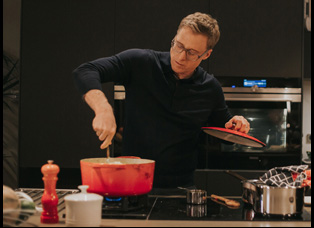
In a way, we were quite mathematical about it. We thought about different types and I would say it’s quite a feminist film because the women are very strong and the men are very weak. Alan Tudyk’s character, on the one hand, you’ve got the dreamer/fantasist architect and then on the other hand, you’ve got his wife who’s basically wearing the pants. She’s a realist and an accountant and she’s got to drive the family forward. Then the other couple, there’s a guy making a lot of money doing something that a lot of people would think on the face of it this is quite immoral, defending criminals, and then his wife works as a counsellor for a charity that helps counsel women that have been sexually assaulted, so these two people are at odds.
One of the things that only really came out when we edited the film is actually it that they benefit from these events, especially Richard and Beth. There’s a lie that’s being lived [in their marriage] and they get to release all the lies and now they’re having to tell the truth. I won’t say where they end up but almost without these terrible things happening, they would have been in a state of ignorance. And this friend of mine Richard [is based on], it’s like [the character] at all — he’s a nicer guy — but whenever you see terrible case [in the news], I’ll have to say to him, “You’re involved in this?” And a question that he’s often asked when people don’t really know him is how could he possibly do this, and [as] Richard says in the film,”Look, I defend all these people but someone has to because they may be innocent and if you live in a society where even the worst people in the world don’t get a defense then you’re not that developed.”
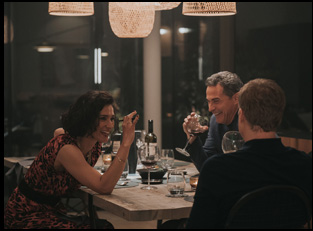
I knew these guys were great. Rufus had done a short film with me where he did this comedy turn and he only had a minute on screen, but he was hilarious because he was so deadpan. He’s well known for playing pretty nasty people, but he said, “Look, I love comedy but people don’t often cast me in comedies because they just think I’m good to play the bad guy.” And Olivia Williams can do anything, so I wouldn’t say it turned out to be different. It just turned out to be great you know because they’ve all got magic. But it wasn’t easy because actors like these keep you on your toes. Somebody said to me a long time ago, “Actors are a bit like racehorses. They’re very skittish and you don’t want to shoot off a pistol next to a racehorse because it might go backwards, so you’ve got to be very careful.”
Good actors are very in the moment, thinking about it all the time and there’s a lot of politics you have to learn — when to be light, when to be tough, when to stand back or when to be a bit stronger. Shirley Henderson said to me while we were filming, “When you’re making a movie with a hero, which most films are, it’s obvious who the star of the film is, so they get the star treatment and everybody else is like the little children,” but when you have a film with four actors who have equal parts, they don’t really know where they stand, so everybody who wants a bit of attention. It’s a bit like children who are all fighting with each other because they’re like, “I want to be the favorite child” and it’s something you have to be aware of because they’re artists and they’re selling the moment, so you’ve just got to be careful that you don’t fire a gun in their ear just before they’re about to deliver the monologue.
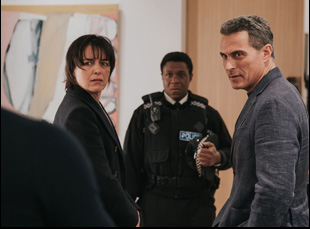
I had to search a long time to find a house big enough. Normally, you would build this [as a set] in a studio, but we didn’t really have the money to do that and you’ve got a living room with a library there with a lot of books. If you were to shoot that [on a set], you’d need to do it in a room twice as big because you’ve got the camera and everybody around and five people back there and you’ve got to put the lights up, so you need a lot of space. I was really wary of people saying, “It’s just in a house” and look, it’s cinema, so I had to make cinema in a house. And somebody said to me the Oscar for best cinematography usually goes to somebody that went out to Montana and films those amazing backdrops and they haven’t got any lights because the light is the sun. But that’s the easiest cinematography — wait until magic hour and anything will look good. But when you’re trying to shoot in one location, you’ve got to constantly work to think how can I make this more cinematic.
I didn’t want it to be a bunch of close-ups because that’s TV as far as I’m concerned, so I used anamorphic lenses and I wanted as wide a picture as possible because you can contain shots with all four people at once. Many years ago, I was working with an editor who was trained under Mick Audsley, who is quite famous, and he said to her, “Every time you cut, you have to have a really good reason why you did that because otherwise you’re interrupting the flow.” So if you can manage to get all your actors in a bigger shot and keep the action going, just moving the camera or the actors, then for me the audience is less distracted and they’re more in the moment. I was thinking about films done in very small [spaces] — that movie Ryan Reynolds did all set in a box after being kidnapped, “Buried.” Everyone said, “How can this be a movie?” But it was full of suspense and most of it, you saw nothing apart from a little bit of his fingers with a little bit of light. You can make cinema in a grave and I think that’s much tougher than going to Montana and pointing at the sunset.
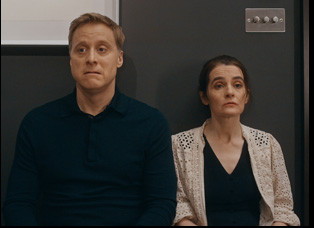
I compose music for my films, but I’m not a film composer. I do know how to have bits of the music jumping in all over the space between the dialogue because I’ve done the dialogue and I can imagine in my head what the music would be and maybe because it’s the same person to me, it’s all part of the rhythmic conversation. There was a sax player Wayne Shorter, who died recently who used to [play with] Miles Davis in the ’60s and ’70s, then he was in Weather Report and I always loved how he sounds like he’s having a conversation with somebody, using the little piano and interpolations.
With the score, I wanted to have some very atonal type piano music (against little birds?) like Thelonious Monk, and I worked with Matt Cooper, an amazing pianist, but he’s such a great pianist he couldn’t do it — he just couldn’t play wrong and sometimes Thelonious Monk does something that sounds wrong and I’m not a great pianist myself, so I found it a lot easier to play the wrong notes in an angular way. It was probably not the way that Hollywood soundtrack composers are supposed to do it because probably the director would go, “Listen, get out of here. Make [the music] more background, you’re jumping in too much.” Not everybody likes it, but I could hear it in my head because I play jazz and to me, jazz is a conversation and if you’ve got some actors and the soundtrack is chatting in the background or pointing out “Look at that guy,” that’s almost what the music was echoing. It was fun to do, I must admit.
“The Trouble With Jessica” opens in theaters on April 25th. A full list of dates and cities is here.




